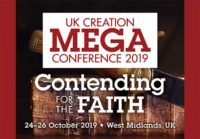By Todd Friel Why is this question asked? While it is likely raised because postmodernism demands that all roads lead to God, it still has some validity because of a man we meet in the book of Genesis: Abraham. …read more Source: AIG Daily
Evolutionary scientists are continually searching for evidence of the “first life” on Earth. Their most recent claim involves well-preserved stromatolite fossils from Australia. Stromatolites are finely laminated biomats formed by colonial cyanobacteria—a complex type of photosynthetic bacteria. Fossil stromatolites are found in mounded structures similar to modern stromatolites. The fossils aren’t composed of the ba… More… …read more Source: icr.org
By Ken Ham Earlier this month, hundreds of pastors, leaders, and other believers from across the United States and other countries gathered in Williamstown, Kentucky, at the Ark Encounter in our new Answers Center for our annual Answers for Pastors and Leaders conference. This conference tackled the question of race from a biblical, scientific, and practical perspective. It was a remarkable conference, and attendees raved about the depth and quality of content. The group of great speakers who joined me included AiG’s Bodie Hodge, Dr. Terry Mortenson, Joe Owen, and Dr. Georgia Purdom. Our guests also included my long-time friends [More]
A useful new resource examining the use of Genesis in the DSS. …read more Source: creation.com
By Harry F. Sanders, III Because of their isolated natural habitats, guppy populations have been used to study the processes of “evolution” in the wild. …read more Source: AIG Daily
By Ken Ham Do you have a student in grades 4–12? Well, we have an opportunity for them! Here at the Creation Museum, we’re offering Explore Days. These are full days of hands-on science learning with a biblical worldview. There’s nothing like these offered anywhere else! Explore Days are full of hands-on science learning with a biblical worldview. There’s nothing like these offered anywhere else! Each student will gain a thorough understanding of the topic through hands-on application, visual presentations, critical thinking, interactive lab components, and expert guest speakers. Explore Days feature a wide variety of topics: Astronomy Chemistry Dinosaurs [More]
Space scientist Dr Henry Richter’s new book Spacecraft Earth explores how Earth is designed for life …read more Source: creation.com
New findings continue to support ICR’s theoretical assumption that biological functions are best explained by engineering principles.1 These findings challenge long-held Darwinian assumptions that the environment is responsible for “selecting” creatures, causing them to adapt. Rather, creatures appear designed from the start to sense their environment and adapt accordingly. The latest research comes from the lab… More… …read more Source: icr.org
By Ken Ham In just a few short days, I am headed across the pond for our annual UK Creation Mega Conference, October 24–26, 2019. In West Midlands, I’ll be speaking on Genesis and the state of the church and culture, how we’re all one race, and how to raise godly children in an ungodly world. And it’s not too late for you to join me and the other apologetics speakers as we “contend for the faith.” As a lead up to this conference, Dr. Jeff Zweerink from Reasons to Believe and I debated issues regarding the book of …read [More]
Were Paul’s letters coauthored? And are the resurrection accounts really plausible? …read more Source: creation.com
A review of ’40 Years of Evolution: Darwin’s finches on Daphne Major Island’ by Peter and Rosemary Grant. …read more Source: creation.com
By Ken Ham If you’re a homeschool parent, I hope you can join me for the Homeschool Family Relationships Summit, an online event hosted by Homeschool Summits. Homeschooling graduates and parents Danny and Megan Craig will be interviewing me as part of their six-day summit, October 14–19, 2019. And you can watch all of the sessions (over 20, featuring a variety of different speakers) live for free! Here’s what Homeschool Summit says about this upcoming event: Homeschooling forces you to fight out relational battles, whether you like it or not. But conflict and challenges are the perfect place for us [More]
A friend of the ministry asks, didn’t Jesus and Paul use nasty language toward their opponents? We give an answer. …read more Source: creation.com
By Bodie Hodge To settle this issue of the reality of dragons, let us turn to the Word of Almighty God who knows all things. …read more Source: AIG Daily
By Ken Ham Humans can’t fix this planet—it’s doomed in its current state. And sadly, the majority of people are also doomed, but there’s real hope! …read more Source: AIG Daily
By Sarah Chaffee On this episode of ID the Future we hear part one of an uncommon trio of experts speaking on the mathematical challenges to Darwinian evolution. Stephen Meyer and David Berlinski, both senior fellows of Discovery Institute’s Center for Science and Culture, join David Gelernter, a distinguished Yale mathematician, who recently gave up Darwinism based on their work. The conversation is led by Uncommon Knowledge host Peter Robinson. Your browser does not support playing Audio, please upgrade your browser or find our podcast on podOmatic Download Episode …read more Source: id the future
A recent study making the news involves the reconstruction of the facial features and anatomy of the enigmatic humans known as the Denisovan from genetic data.1 In the evolutionist’s own words who did the study, “Denisovans are an extinct group of humans.” And the scientists’ research shows exactly that. Denisovan fossils are represented by only a few teeth, a finger bone, a bit of a mandi… More… …read more Source: icr.org
By Ken Ham We recently introduced yet another unique experience for our Ark Encounter guests. We’ve opened up the large ramp outside the Ark for guests to walk up and take photos, including getting their picture taken in front of the massive door into the Ark. It’s a great experience—with a beautiful view of the Ark grounds and the surrounding countryside. Guests are loving it. I recently visited the Ark and did a Facebook Live video walking up the ramp. I met guests from a variety of states at the top, as well as the Ark Encounter’s resident gospel group, [More]
An insurmountable impediment to evolution. …read more Source: creation.com
By Ken Ham You may have seen headlines recently with phrases like “lizard-men evolution,” “leftovers from our lizard evolution,” or even “human embryos go through lizard stage.” These headlines were reporting on a study that claims that human embryos (babies in the early stages of development) supposedly have muscles not found in adult humans, but are found in lizards. Therefore, these evolutionists believe this is a throwback to 250 million years ago when we shared a common ancestor with lizards. But what does a world-class anatomist who specialized in embryology have to say about this research? Well, he summed …read [More]
By Ken Ham It’s already beginning to look a lot like Christmas here at the Creation Museum and the Ark Encounter in Northern Kentucky. Our grounds crew at the Creation Museum has been working since August to install the gorgeous lights that will form our breathtaking garden of lights, which gets better each year—as hard as that is to imagine when you’ve seen how spectacular they’ve been. And it’s only a few more weeks (November 29–December 30, 2019) until you can come and enjoy it for yourself during our free ChristmasTown event at the Creation Museum. And that’s just one [More]
The framework hypothesis is a stratagem for harmonizing Genesis with the atheistic theory of evolution, so it should be shunned by all Christian organizations that depend on Bible-believers for support. …read more Source: creation.com
By Stephen C. Meyer On this episode of ID the Future we hear the final portion of a three-part series featuring Discovery Institute’s Stephen Meyer and David Berlinski along with distinguished Yale computer science professor David Gelernter, who recently gave up Darwinism thanks in part to their books. Led by Uncommon Knowledge host Peter Robinson, they discuss the hard problem of consciousness, how Darwinism functions as a religious dogma that punishers dissenters, and whether biology can ever “get over Darwin and move on.” This interview is presented here courtesy of Peter Robinson and the Hoover Institution. Your browser does not [More]
By Ken Ham When it comes to the question of gender, God’s Word is clear, “So God created man in his own image . . . male and female he created them” (Genesis 1:27). God has created humans male and female. (A tiny percentage of people can have genetic issues in this fallen world, but that does not negate the created order.) Gender is not on a spectrum, men cannot become women, and women cannot become men. And that clear biblical teaching (which is also obvious from biology)—accepted by nearly everyone until very recently—has been declared “incompatible with human …read [More]
By Prof. Stuart Burgess Don’t look now, but you’re being watched by an amazing variety of magnificent eyes. …read more Source: AIG Daily
By Ken Ham You’re invited to join us at the Ark Encounter, in our brand-new Answers Center auditorium, for Answers for Women, March 27–28, 2020. The theme this year is Truth: Uncovering the Lies We Believe. So many false teachings are dressed up in just enough half-truths or Christian lingo to sound like the truth. How do we discern truth from error? Get answers at this unique conference that deals with contemporary issues with powerful biblical apologetics teaching. Meet the Speakers Two of the speakers coming to Answers for Women will be from AiG, molecular geneticist Dr. Georgia Purdom, who [More]
Big Bang scientists recently used a new method to estimate the universe’s age. This method yields an age estimate that could be over two billion years younger than their current age estimate of 13.8 billion years.1,2 However, this new method has large uncertainties, so not too much can be made of this result. It’s mainly of interest because it reminds us how Big Bang age estimates often contradict one another. … More… …read more Source: icr.org













































